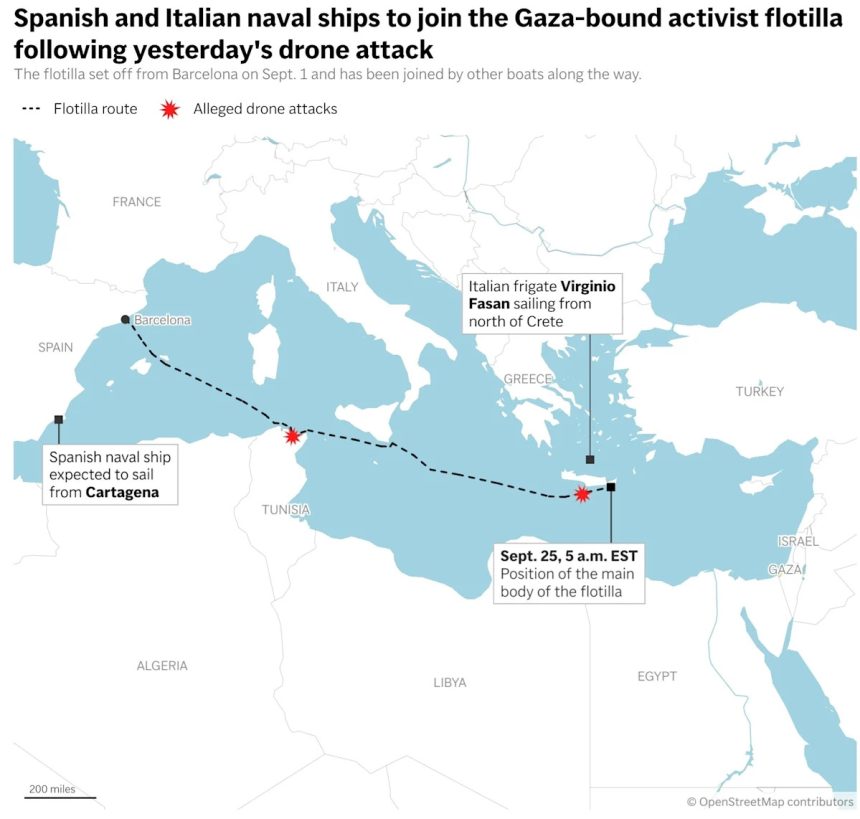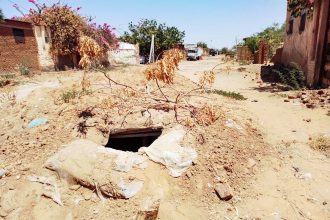ATHENS, Greece (AP) — Spain and Italy say they are sending navy ships to where a flotilla of boats carrying activists seeking to break Israel’s blockade of Gaza is sailing, after the activists said they were attacked by drones near Greece.
The Global Sumud Flotilla said Wednesday it was targeted by drones and communications jamming, with several explosions occurring on or near some of the boats. Some of the vessels were damaged, but no injuries were reported.
Here’s what to know about the flotilla.
The Global Sumud Flotilla’s aim
Organizers say the flotilla currently includes 52 mostly small vessels carrying activists from dozens of countries. They are carrying a symbolic amount humanitarian aid, mainly food and medicine, for Palestinians in the besieged enclave of Gaza.
The 23-month war has led to a humanitarian catastrophe in the territory that has seen much of it reduced to rubble. The world’s leading authority on food crisis has declared famine in Gaza’s largest city.
Activists hope their actions will focus attention to the plight of Palestinians. They say the flotilla is the largest attempt to date to break Israel’s maritime blockade of the Gaza Strip, which has now lasted 18 years, long predating the current war in Gaza.
Israel says the blockade is needed to prevent Hamas from importing arms, while critics consider it collective punishment.
The boats’ journey
The core vessels set sail from Spain on Sept. 1, heading east across the Mediterranean, and have been joined by boats from other countries along the way.
The flotilla includes larger vessels that are providing support and provisions for smaller boats.
Participants include high-profile activists such as Swedish climate activist Greta Thunberg and former Barcelona mayor Ada Colau, as well as members of Italy’s parliament and the European parliament. Organizers say delegates from 46 countries had committed to participating, with activists including military veterans, doctors, clergy and lawyers.
The bulk of the flotilla was sailing south of the Greek island of Crete on Thursday, heading eastwards. Organizers said they expected to reach the Gaza area within a week.
Attacks on the flotilla
Organizers have reported at least three separate instances of participating boats being targeted by drones: twice in Tunisia on Sept. 8 and 9, and once while sailing south of Greece in the early hours of Wednesday.
In the latest attack, the flotilla said it was targeted during the night by “unidentified drones and communications jamming.” Activists said “at least 13 explosions” were heard on and around several flotilla boats, while drones or aircraft dropped “unidentified objects” on at least 10 boats.
No casualties were reported but there was damage to the vessels and “widespread obstruction in communications,” it added.
Israel’s reaction
The Israeli military did not immediately respond to questions regarding Wednesday’s drone attack.
The Israeli Foreign Ministry has accused organizers of being linked to Hamas, a claim organizers reject. Israel has proposed the activists unload their aid in the Israeli port of Ashkelon for it to be transported into Gaza, saying it will not accept any breach of its blockade.
“Israel will not allow vessels to enter an active combat zone and will not allow the breach of a lawful naval blockade,” the ministry said on Monday.
International reaction
Italy and Spain said they were sending military ships to provide assistance and possible rescues if needed.
“The Spanish Government demands that international law be complied with and that the right of our citizens to navigate the Mediterranean safely be respected,” Spanish Prime Minister Pedro Sánchez said.
Speaking in parliament Thursday, Italian Minister of Defense Guido Crosetto said his government expressed “its strongest condemnation” of the drone attack and said that “actions of this type, carried out against civilian boats on the open sea, are totally unacceptable.”
Crosetto told lawmakers that an Italian frigate sailing nearby, the Fasan, as well as another navy ship, the Alpino, had been activated to intervene in case rescues were necessary. The aim was to make clear to flotilla organizers that they are running a risk “independent of the fact that they’re going to do good.”
The minister asked the flotilla to offload the aid in Cyprus instead, saying the Italian government and Italian Catholic Church could get the aid to Palestinians without risking a possible “hostile act” by Israel.
“We are not in the position to guarantee its security, once (the flotilla) has left international waters and entered the waters of another state,” he said, adding that if the flotilla enters Israeli waters “it could be considered by that country a hostile act.”
U.N. Human Rights Office spokesperson Thameen Al-Kheetan called for an investigation, while the European Union also warned against the use of any force. “The freedom of navigation under international law must be upheld,” said Eva Hrncirova, a European Commission spokesperson.
Past attempts to break Israel’s blockade of Gaza
It is not the first time activists trying to break Israel’s Gaza blockade have come under attack.
Another vessel said it was attacked by drones in May in international waters off Malta. An overland convoy traveling across North Africa also attempted to reach the border but was blocked by security forces aligned with Egypt in eastern Libya.
In 2010, Israeli commandos raided the Mavi Marmara, a boat participating in an aid flotilla attempting to breach the maritime blockade of Gaza. Nine Turkish citizens and one Turkish-American on board were killed.
The current war
The war began on Oct. 7, 2023, when Hamas-led militants stormed into Israel and killed 1,200 people, mostly civilians, and took 251 others hostage. Israel says its offensive is aimed at pressuring Hamas to surrender and return the remaining 48 hostages, about 20 of whom Israel believes are still alive. Most of the rest were released in ceasefires or other deals.
The Israeli offensive has killed more than 65,000 Palestinians, according to the Gaza Health Ministry. It does not say how many were civilians or combatants, but says around half were women and children.
___
Nicole Winfield in Rome and Suman Naishadham in Madrid, Spain contributed.









